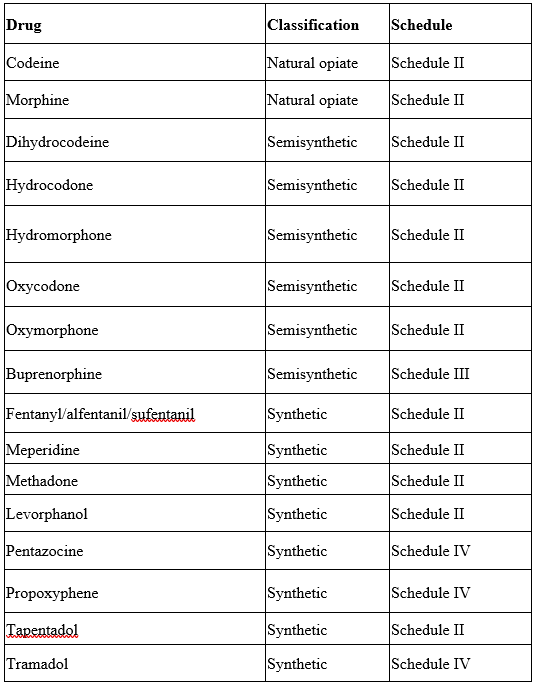Thebaine: A Building Block of the Opioids
Dr. Joseph E. Graas, Scientific Director
Dr. Edward Moore, Medical Director
Opium has been used in ancient medicine for a very long time. From a technical point of view, the compounds that are active in the poppy plant are only morphine, codeine, and thebaine. These compounds are referred to as the natural opiates. In modern medicine, morphine and codeine are used for pain management. The compounds formed from thebaine as the starting material are the semisynthetic opiates. Examples of these are oxycodone, oxymorphone, hydrocodone, hydromorphone, buprenorphine, naloxone, and various other minor opiates. Opioids are synthesized compounds that are pharmacologically related to action of natural opiates. Common synthetic opioids are meperidine, methadone, and fentanyl. However, sometimes the term “opioids” is used to refer to all of the compounds that render their pharmacological effects by acting as agonists of opiate receptors. Opioids are widely used in pain management in both cancer and noncancer patients. Commonly prescribed opioids are listed below. Naloxone and naltrexone are common opioid antagonists used medically to treat patients with opiate overdose. Sometimes naloxone or naltrexone are combined with an opioid to lower abuse potential of prescription opioid.

Thebaine, also called paramorphine, is an opium alkaloid found in the dried latex from the poppy plant (Paper Somniferous). The thebaine is found in bulk poppy seeds along with codeine, morphine and papaverine in amounts of 0.3 to 1.5%. These poppy seeds from the plant are use in food, such as muffins, in concentrations of 0.3-14 mg/kg. Thebaine has no current therapeutic use but it is the central component as the starting raw material in the commercial production of other related semisynthetic opioid drugs.
There are two food products or sources that can potentially contain the natural opiates; bakery products that contain poppy seeds and tea made from poppy seeds and poppy straw. An often-cited publication states that subjects given 11g of poppy seeds to eat had thebaine in their urine samples in the concentration of 2-82 ng/mL, and urine samples from subjects that self-admit to using opiate street products, had non-detectable amounts of thebaine. While this is not conclusive regarding use or nonuse of street heroin or pills, it demonstrates the magnitude of the thebaine in the urine specimens. It should be present and relatively small in concentration.
Typically, poppy seeds used in food preparation are washed, which removes up to 90 percent of the opioids. However, the seeds, stems, and pods sold to make poppy seed tea are often unwashed. Poppy seeds can vary greatly in their concentrations of codeine and morphine, meaning that the strength of the tea made by one crop of seed can be quite different than tea made from another crop of seed. In addition, the strength of the tea produced is dependent on the washing and preparation method, as well as the quantity of raw material used. Due to the variability in the production process and the inconsistencies of the concentration, it is difficult to predict the potency of the final product. Additionally, how one person metabolizes the poppy seed is not how someone else will metabolize the same seed. One study gave poppy seeds to volunteers and there was a large variation in how much codeine and morphine were excreted in their urine.
Poppy pods, straw (the pods and stems) and/or seeds are used to create a poppy tea which gives an opioid high. The dried pods or straw are ground into a powder and steeped in water. This is a popular way to extract the opioids from the poppy and make a tea. Although the pods tend to have a higher concentration of opioid, poppy seed tea can have very unpredictable consequences. A study has shown it is possible to create a lethal dose of morphine in poppy seed tea brewed at home. Because it is almost impossible to tell what the concentration of the active drugs might be in any one crop of poppy pods or poppy seeds, it is impossible to “control” the drug enough to avoid overdose.
![]()
References
J Anal Toxicol. 1997 Sep;21(5):376-83
Quantification of Morphine, Codeine, and Thebaine in Home‐Brewed Poppy Seed Tea by LC‐MS/MS, Deborah Powers M.S. , Stephen Erickson M.D. , Madeleine J. Swortwood,Ph.D., J. Foren Sciences, Volume63, Issue4 July 2018
